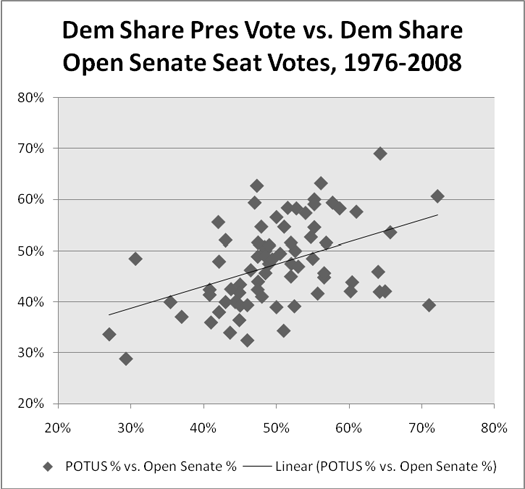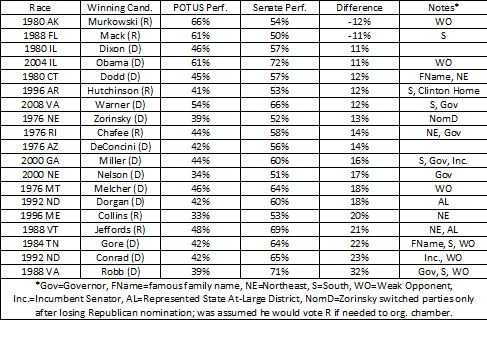The bigger problem for Governor Lingle, though, will be the Presidential race. Candidates for open Senate seats rarely run far ahead of the Presidential candidate, and Lingle will probably need to run in excess of twenty points ahead of Barack Obama to capture the seat, even correcting three- to four- points for his "hometown advantage." Larry Sabato and Isaac Wood of the Center for Politics touched on this concept this morning, looking at "competitive" Presidential-year Senate races from 1980 to 2008 and concluding that Lingle faces an uphill climb.
Building off of Sabato and Wood's analysis, I dug a bit deeper and looked at the Democratic share of the two-party vote in every open Senate race in Presidential years from 1976 to 2008 (73 races in total). I then compared this to the Democratic Presidential candidate's share of the two-party vote in the state in the year that the Senate race was held.
On average, the Democrat ran about three points ahead of the Democratic Presidential candidate; the median was two points. Performing a regression of the Democratic Senate results against the Democratic Presidential results confirms that there is indeed a strong, significant relationship between the two variables (t=4.2, p=.0000752).
If we look at the scatterplot of the results we see that there are quite a few outliers:

If we remove just the ten-worst outliers from our consideration, the correlation between the two variables improves significantly. This is the good news for Governor Lingle - it suggests that while the typical candidate in an open Senate race hews closely to the Presidential result, this is not a hard, fast rule. The question is whether Lingle could be an exception to the rule.
To flesh this out, let's examine the outliers in detail, looking at the 19 races where a Senate candidate ran more than 10 points ahead or behind of the Presidential candidate. The following chart shows the year and state of the open Senate seat race, the name and party ID of the winning candidate, the performance of the winning candidate's Presidential Party (minor parties excluded), the winning candidate's performance (minor parties excluded), and the difference between the two:

Right away, three warning signs for Lingle jump out. First, for whatever reason, only six of the nineteen outlying races involve Republicans, including the only two who ran well behind their party's presidential candidate. This could be a result of the unusual weakness of the Democratic Presidential candidates during many of these years, although we'd probably expect to see more Republican underperformances if that were the case.
Second, only two of the 19 outliers (11 percent) have occurred in the last two cycles, while seven of the 19 outliers (36 percent) occur in 1976 or 1980. This is true even though 20 percent of the open Senate seats in our time period occurred in the last two cycles, and 22 percent of the open Senate seats occurred in 1976 or 1980. This probably represents the well-documented increase in political polarization during the time period; it seems it will be more difficult for Lingle to distance herself from her party's nominee this cycle.
Finally, if we assume Lingle will have to run about twenty points ahead of President Obama, we see that only five candidates have achieved this feat in the past 36 years. Four of those instances involved candidates caught in the midst of the Great North/South Realignment of the twenty-first Century. In other words, Jeffords and Collins were two of the last holdouts of liberal Northeastern Republicanism, while Robb and Gore were two of the last holdouts of conservative Southern Democracy. None of the four would probably perform as well today. Moreover, three of the five faced only nominal opposition. That leaves Senator Conrad, whose run for an open seat was more of a technicality than an actual open seat run, as he was an incumbent Senator running for the opposite seat.
Looking at the outliers, we see a few common threads. So I expanded the regression analysis to include a few of them: Whether either candidate was a sitting Governor, whether either candidate represented the state statewide in Congress, whether either candidate had a famous political name, whether either candidate was a nominal candidate, and whether, like Conrad, the candidate was a de facto incumbent (think also Zell Miller in 2000 or Roger Wicker in 2008). I also tested the effect of a seat being in the South (thinking Southern Dems would tend to overperform their party's nominee) versus a seat in the Northeast (vice versa).
Without getting into the mathematical weeds, the regression analysis incorporating the additional variables mentioned above produced the following bottom line results: in open seats, in 2012, a Democrat should receive .4 points for every point Barack Obama receives. If the Democratic candidate is a governor or former governor, that adds 5.5 points to the Democrats' total.If the Republican candidate is a governor or former governor, that subtracts 5.5 points. If the Democratic candidate is a "nominal" candidate he/she should subtract 9.9 points; if the Republican opposition is "nominal" the Democratic candidate should gain 9.9 points.
What this means is that a generic Hawaii Democrat running against a generic Hawaii Republican should receive about 60 percent of the vote for the Senate seat, assuming Obama once again receives 73 percent of the vote. If Lingle runs, she would get the "gubernatorial bonus" of 5.5 points but still lose 45-55. The only way the model predicts a win for Lingle would be if the Democrats nominate a nominal candidate or if President Obama fell below 60 percent in the state, neither of which seems likely.
To be sure, this model has an error margin; there were 16 instances where it was off by more than 5 points. But given the intangibles here - the fact that Lingle enjoyed only modest popularity when she left office and the fact that the Democrats will probably nominate a very formidable opponent, her run seems like it would largely be uphill.